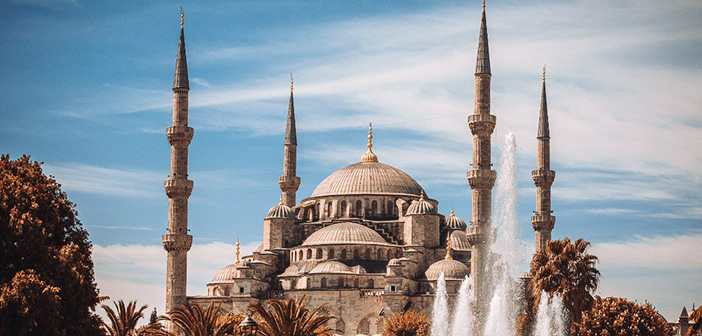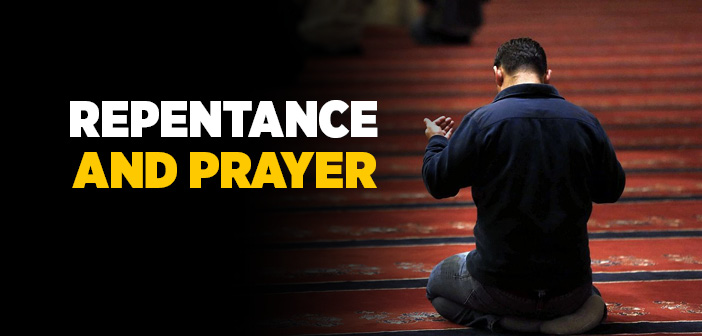What does Islam say about morality? The principle and fundamental purpose of Islamic morality is love: love for Allah and love for Allah’s creatures. The religious conception is that mankind will behave morally and treat each other in the best possible manner to please Allah.
“There will be nothing weighing heavier on the scales of a Muslim in the Hereafter than good morals. Allah the Almighty hates those who act and speak ill.” (Tirmidhi, Birr, 62)
Allah, glory unto Him, has endowed human beings with an aptitude for elegance, grace and spiritual depth. The value of a human being is only to the extent he allows these attributes to flourish on the soil of his heart. Becoming a human being, not only physically but also and more importantly spiritually, makes it necessary to embody good morals and render bad habits ineffective.
Hearts replete with spirituality act as agents manifesting good morals, righteous conduct and a spiritual state of mind. It is in this manner that a servant may live up to the fact of being created in the best fashion.
In contrast, in hearts that have been vanquished by the ego, kufr, shirk, wicked habits, lustfulness and delusive whispers (waswasah) run rife. And eventually, the heart forgets its Lord and becomes blinded, going in the complete opposite direction of its reason of existence. Worse still, it can even become baser than witless creatures.
The Creator of the Universe addresses man with a stern warning, calling him to come to his senses and not debase himself:
“O man! What has made you careless concerning your Lord, the Bountiful, Who created you, then fashioned, then proportioned you? Into whatsoever form He will, He casted you.” (al-Infitar, 6-8)
The Almighty also declares, in the Quran:
“Allah invites to the Daru’s-Salam.” (Yunus, 25)
Yet, every invitation comes with its conditions. Not everyone is ever invited to a certain place. There are always conditions of acceptability. Only with a qalbu’s-salim, a refined or peaceful heart, may one attend the Divine invitation to the Daru’s-Salam, The Abode of Peace.
The sole condition for living morally, in a manner befitting of human existence, is to get hold of the sublime objectives laid down by religion. The perfection of human existence and the peak of good morals, likewise, is the Blessed Prophet -upon him blessings and peace-. Both confirming and affirming this, are the words of the Almighty:
“And you stand on an exalted standard of character.” (al-Qalam, 4)
The Beloved Prophet -upon him blessings and peace- states in a number of ahadith:
“My Lord has trained me and how beautifully has he trained me.” (Suyuti, al-Jamiu’s-Saghir, I, 12)
“There will be nothing weighing heavier on the scales of a Muslim in the Hereafter than good morals. Allah the Almighty hates those who act and speak ill.” (Tirmidhi, Birr, 62)
“I have been sent to perfect good morals.’ (Imam Malik, Muwattaa, Husnu’l-Khulq, 8)
Prophet Muhammad Mustafa -upon him blessings and peace- is not just the only prophet, but also the only person in history to have every single, intricate detail of his life documented. His every word, action and expressed feeling was recorded and bequeathed to entire human kind as an emblem of honor. His uswatu’l-hasanah; that is his quintessential example; has provided a blueprint for entire humanity, declared by the Almighty in the Quran as: “Certainly you have in the Messenger of Allah an excellent exemplar for him who hopes in Allah and the latter day and remembers Allah much.” (al-Ahzab, 21)
While it is imperative to seek a share of the Blessed Prophet’s -upon him blessings and peace- heart-world and his impeccable morals, this may take place only to the degree of love felt for him and the extent in which one enshrouds himself in his spirituality. Through the reflection of and spiritual coloring (insibagh) received therefrom, a Muslim acquires a zest for character traits like compassion, mercy, benevolence, forgiveness and sharing what he has with his brothers and sisters of religion. Of this, the Companions, saints, the righteous and the pious provide consummate examples.
By drawing nearer to the reality of the Blessed Prophet -upon him blessings and peace- and virtually becoming moths around the flame of his spirituality, these believers of elegance have always considered annihilation in the Prophet’s -upon him blessings and peace- spirituality as the greatest blessing one may receive in the entire world. Muslims, throughout history, who have been able to acquire a share of the quintessential example of the Prophet -upon him blessings and peace-, have thereby allowed the growth of their iman to its furthermost extent and by maturing the joy for the Divine embedded in their natural disposition, have acted as a torch for humankind. In loving him lies the most effective cure for ill and unmindful hearts.
Below are just some examples typical of his towering moral character and conduct:
The Blessed Prophet’s -upon him blessings and peace- countenance was the most sparkling and attractive of all countenances. Immediately after the Hijra, Abdullah ibn Salam, then a Jewish scholar, had inquisitively asked around to catch a glimpse of him and remarked, upon finally seeing him:
“Such a face can never lie”. These were his final words as a Jew, as he embraced Islam at the instant. (Tirmidhi, Qiyama, 42/2485; Ahmed ibn Hanbal, Musnad, V, 451)
Endowed with an immense degree of beauty, awe inspiring majesty and a dazzling elegance, he really needed neither an extra proof, nor a miracle to prove the fact that he was the Messenger of the Lord. Whenever the Blessed Prophet -upon him blessings and peace- would become pleased or displeased, one could immediately see it in his expression. His pure body had embodied an intense vigor, a strong sense of haya and a rigorous determination. He was more decent than a maiden enshrouded in her covering. As for the depth of the sensitivity of his heart, it is impossible to articulate.
Never uttering a word in vain, his every word conveyed wisdom and advice. There was not the least place for backbiting and futile talk in his vocabulary. He would talk to people according to their capacities. He was kind and modest. Though he would never express his joy through excessive laughter, his face always put a warm smile on view. Suddenly seeing him would overwhelm one in awe; though a brief conversation was enough to implant feelings of deep love and affection towards him.
He would treat the righteous with respect, according to their ranks of piety. His relatives were treated by him with honor and respect. It was habitual for him to extend the tenderness he nurtured for his family and friends to the rest of society, saying: “You will not have become a matured Muslim until you wish for your brothers what you wish upon yourselves.” (Bukhari, Iman, 7; Muslim, Iman, 71-72) He would treat his servants inexpressibly well, clothing and feeding them with whatever he clothed and fed himself. Generous and compassionate, the Prophet -upon him blessings and peace- had struck a perfect balance between courage and kindness, compliant with the given circumstance.
The Messenger of Allah -upon him blessings and peace- was a man of his word, always true to his promise. Superior to all in terms of virtue, intelligence and acuteness of mind, his physical and spiritual uniqueness could not possibly be overstressed.
He had a constant look of sorrow about him. Withdrawn into an uninterrupted state of contemplation, he only spoke when necessary. His spell of silence was lengthy. With that said, he would complete every sentence he begun, collecting layers of meaning in just a few words. He would utter his words piece by piece. With a gentle predisposition, his stature was nevertheless majestically imposing.
He would never get up from his seat when angry. And never would he become angry, unless there was an infringement of right. Given there was an infringement of right gone unnoticed, his anger would never subside until the right was restored. And afterward, he would once again resign to his usual composure. Getting angry on his own behalf was not his nature; he would never develop a vendetta and become quarrelsome in a personal matter.
He would never enter the household of anyone without permission. Once he returned home, he would divide the time he would spend there into three parts: the first for Allah, glory unto Him, the second for his family and the third for himself, though only by name, as in effect he would spare that time for all kinds of people, common and elite, depriving not a single person of his precious time, leaving not a single heart unconquered.
The Blessed Prophet’s -upon him blessings and peace- each state and behavior was an expression of dhikrullah.
At mosques, he would assume different places for seating, to prevent others from making a habit of sitting in a particular place, wary of the consecration of certain places and cites. He disliked the adoption of conceited behavior in public. Upon entering an assembly, he would take whatever seat available, insisting others do the same.
Whenever a person wanted something from him in sorting out a particular problem, irrespective of the importance of the favor, the Blessed Prophet -upon him blessings and peace- would never feel at ease until that need was aptly taken care of. Given the impossibility of sorting the problem out, then the Prophet -upon him blessings and peace- would at least comfort the person with some soothing and heartening words. He was a confidant for all. No matter what their social classes were, whether rich or poor, wise or ignorant, people would receive even treatment next to him, solely from the vantage of being a human being. All his gatherings were environments teeming with kindness, wisdom, manners, patience and trust, first and foremost in Allah, glory unto Him, then in each other.
Never would he publicly condemn a person for his shortcomings. When the need would appear to warn a particular person, the Noble Messenger -upon him blessings and peace- would do as little to subtly yet elegantly hint at it, without breaking the person’s heart. He would say: “Do not rejoice over a disaster that befalls your brother…for Allah may relieve him through His mercy and test you with the same disaster.” (Tirmidhi, Qiyamah, 54)
Not only was he never preoccupied with prying the concealed flaws of others, he was stern in prohibiting others from getting busy with such ignobility. Prying and suspicion of others was, after all, banned by the Almighty.
The Light of Being -upon him blessings and peace- would not speak, unless with an aim for Divine pleasure. His conversations would emit spiritual ecstasy. So attentively would the Companions listen to him as he spoke and so captivated they would be that in the words of Omar -Allah be well-pleased with him-, if a bird were to come and perch on their heads, it could have been able to remain there undisturbed for hours on end. (Abu Dawud, Sunnah, 23-24/4753) The manners and haya that had reflected onto his Companions were of such intensity that, more often than not, even asking him questions was deemed as impudent. They would hence wait for a Bedouin to perhaps arrive from the desert and inadvertently drop in to ask the Prophet -upon him blessings and peace- questions and spark a conversation, from whose spirituality they hoped to benefit. (See, Ibn Saad, I, 422-425; Haythami, IX, 13)
Abu Hurayra -Allah be well-pleased with him- describes the depth of his compassion:
“During the heated moment of a battle, we insisted the Messenger of Allah -upon him blessings and peace- to curse the idolaters to perish. But he said, ‘I have not been sent to curse but as mercy.’” (Muslim, Birr, 87)
About the Blessed Prophet -upon him blessings and peace-, Allah, glory unto Him, states in the Quran:
“And We have not sent you but as a mercy for the worlds.” (al-Anbiya, 107)
Ahmed ar-Rifai -may Allah sanctify his secret-, the great man of spirit, offers the below advice to his spiritual children:
“Expend, seeker of wisdom, all your existence in the way of the Real. Abide by the Sunnah of the Messenger of Allah -upon him blessings and peace-. Spend your day and night within the ambiance of worship and rightful conduct. Only in this way may you attain marifah. There is otherwise no share of it for you. Unable to become one with his hal, you will end up a defective servant.”
The utterly magnificent character of the Blessed Prophet -upon him blessings and peace- which we have here attempted to summarize so far within the limited opportunity provided by words, are like mere drops trickling onto our understanding from that Great Ocean. The secret behind wasl ila’Allah, or reaching Allah, glory unto Him, lies in becoming intimate with the Book of Allah and the Sunnah of His Prophet, with a genuine heart, and in loving those whom Allah and His Messenger loves and detesting whom they detest.
F or the wise, the universe is a magnificent parade of Divine manifestation and art offered up to human gaze, while for the fool, it is simply a podium of consumption and lust.
Source: Osman Nuri Topbaş, Sufism, Erkam Publications





